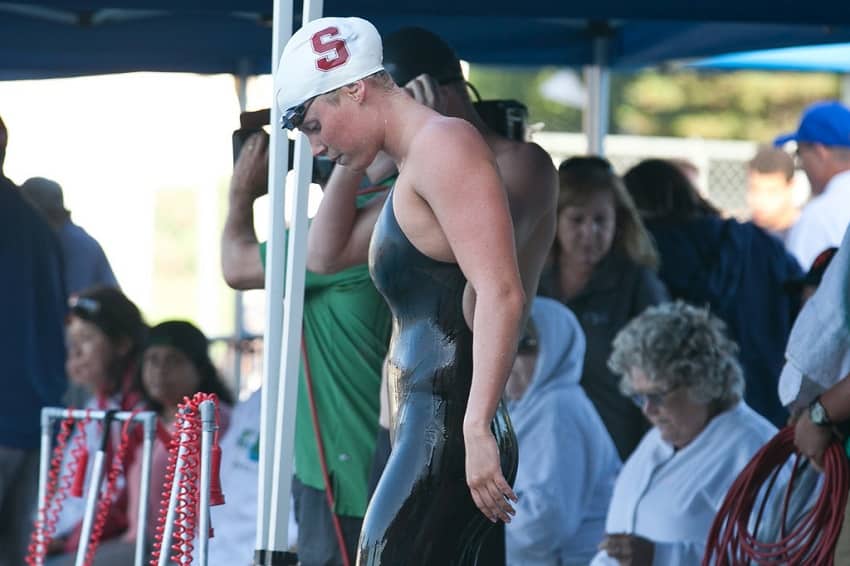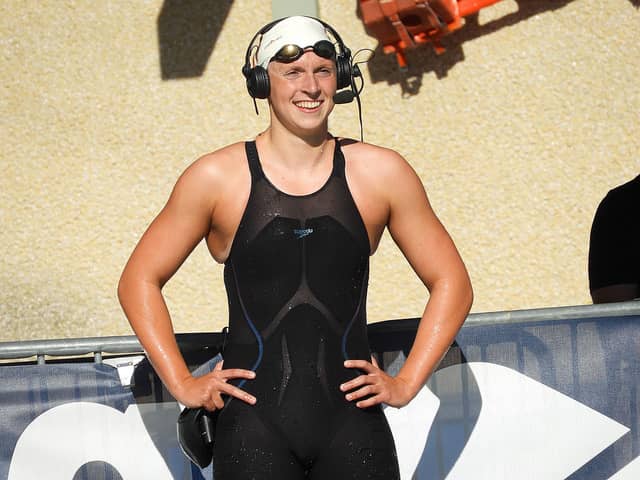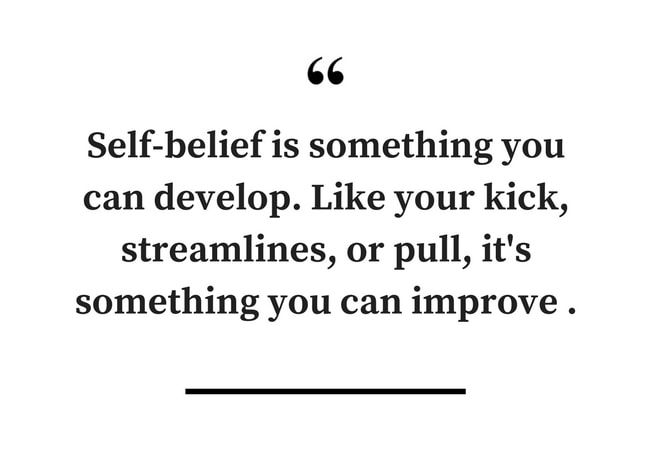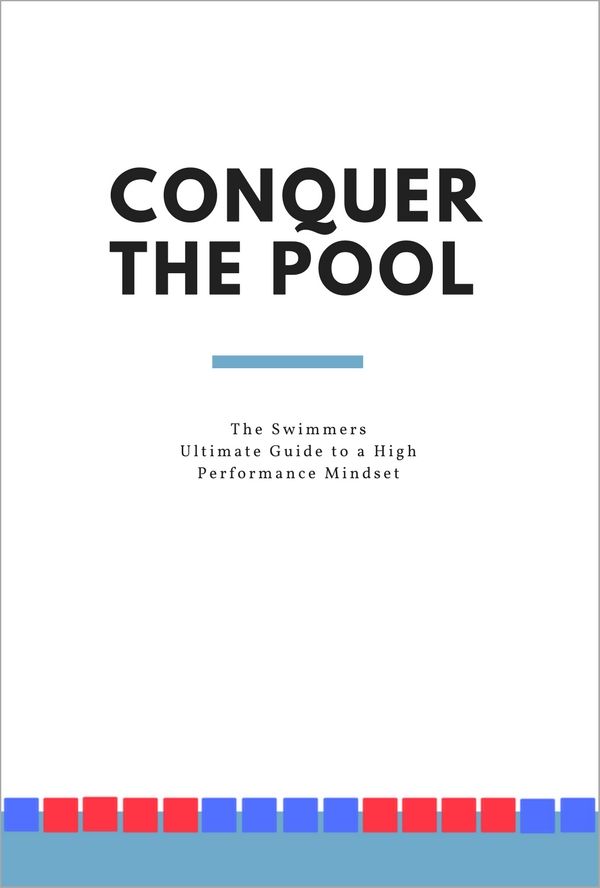Having self-belief isn’t sitting around wishing and hoping that you were stronger mentally. You can develop your self-belief just like a muscle. Here’s how.
No one knows swimming into uncharted territory better than Katie Ledecky.
She’s broken so many records and dominated so many races over her career that it’s easy to take it for granted how great she’s already become. This greatness belies a (natural) measure of self-doubt, however.
In 2013, after she had dominated the world’s best swimmers in Barcelona at World Championships, she sat down with her coach Bruce Gemmell to discuss goals for the rest of the quad.
The goal times they set were nothing short of next level: Gold in the 200m freestyle. Dropping three seconds off the WR in the 400m freestyle. And shaving eight seconds off her own WR mark in the 800m freestyle.
Ledecky’s goals were audacious, with Ledecky acknowledging that knowing someone else believed in these things too made a difference:
“I always rely on him to help set my goals, because you never know what’s possible unless you hear somebody else say it,” said Ledecky after her epic Rio performance.
Ledecky’s success is rooted in a variety of factors, from having supportive parents, great coaches, to “some” natural born talent.
Far and away her best asset, according to Gemmell, is her work ethic and self-belief.
This kind of repeated willingness to fail without a loss of enthusiasm comes from Ledecky’s strong sense of self-belief.
She believes in herself, believes in the process, and knows that as long as she shows up and works hard that good things will happen.
How Swimmers Can Improve Their Self-Belief
You can work at self-belief.
Although we tend to treat it as something mystical, and as something swimmers are either gifted with or not, you can cultivate and sharpen your belief with a little bit of consistent work.
Like a muscle, belief in what you are doing, in your process, and your hilariously ambitious goals is something you can strengthen.
Here are some quick ideas you can use to get the self-belief ball rolling:
- Throw together a list of motivational quotes that get you jacked up and read them to yourself every morning.
- Consistent drops of inspiration. Spend 20 minutes each day reading from an inspirational book (doesn’t have to necessarily be a swimming-related book, either). Caeleb Dressel, sprint god, set himself a goal this year of reading 10 pages a day of self-improvement books.
- Focus on the things you can control; it’s easy to feel like the world is out to get us when we allow things we don’t control influence our levels of self-belief (and consequently how much action we are taking towards our goals). This is where it’s handy to understand what your process is.
- Write out a quick pick-me-up on your water bottle or a piece of swim gear that is front and center with you at practice each day. Sometimes just looking up and seeing, “I believe in me” or “You got this” on your water bottle or kick board can be enough to give you a little nudge forward.
- Spend more time with the go-getters in your life. This might not be easy, and it might require pulling the rip chord on some of the Debbie Downers in your life, but motivation is contagious. For better and for worse.
- Build an environment that promotes awesomeness. There’s a reason that teams hang championship banners, post pictures of their Hall of Famers in the hallways, and talk about their past successes: They are telling a story of excellence. When the environment says that great things happen here, and that great things are expected here, it helps close the gap between where you are now and where you want to go with your swimming.
- Take it easy on the negative self-talk. Self-belief, ultimately, is a large result of how our inner dialogue goes. If we phrase setbacks and adversity with self-talk such as, “See, I knew I couldn’t do this” or “I’ll never be successful” it’s no wonder our self-belief craters. Get curious with your self-talk so that you don’t close off opportunities before you have a chance to maximize them: “Yeah, this set is brutally hard, but let’s see what happens if I give it my best effort the whole way through.”
The big thing with self-belief is consistency.
It’s not enough to do it once, or to say that “Yeah, yeah—I know.”
Self-belief is built up over time with repetition. Its power comes in the accumulation of those little moments where you decide to act in a manner that develops it.
You might not notice the effects of your strengthened self-belief right away, and the change may happen so slowly that it’s imperceptible, but at some point…
Maybe not next week, or next month even…
But at some point, it will happen…
And you’ll be able to look back and see how far you’ve come, and how powerful your self-belief and confidence have become.
 Frustrated with inconsistent performances in training and competition?
Frustrated with inconsistent performances in training and competition?
Tired of choking on race day? Want to finally conquer your mindset so that you can give your PB’s the beating they deserve?
Conquer the Pool: The Swimmer’s Ultimate Guide to a High Performance Mindset might just be for you. Used and trusted by some of the top clubs and swimmers on the planet.
More Stuff Like This:
This Mental Training Workbook Will Help You Swim Like a Rock Star This Season. Confused about mental training? Want to unleash pro mode on your swimming this year? Learn how this mental training workbook will change your mindset and help you pummel your PB’s this season.
Why You Should Be Grading Your Effort After Practice. One of my favorite ways to stay consistent and accountable in practice is this simple technique. Takes about three seconds, and will keep you honest about the effort in the water.




 Frustrated with inconsistent performances in training and competition?
Frustrated with inconsistent performances in training and competition? 











